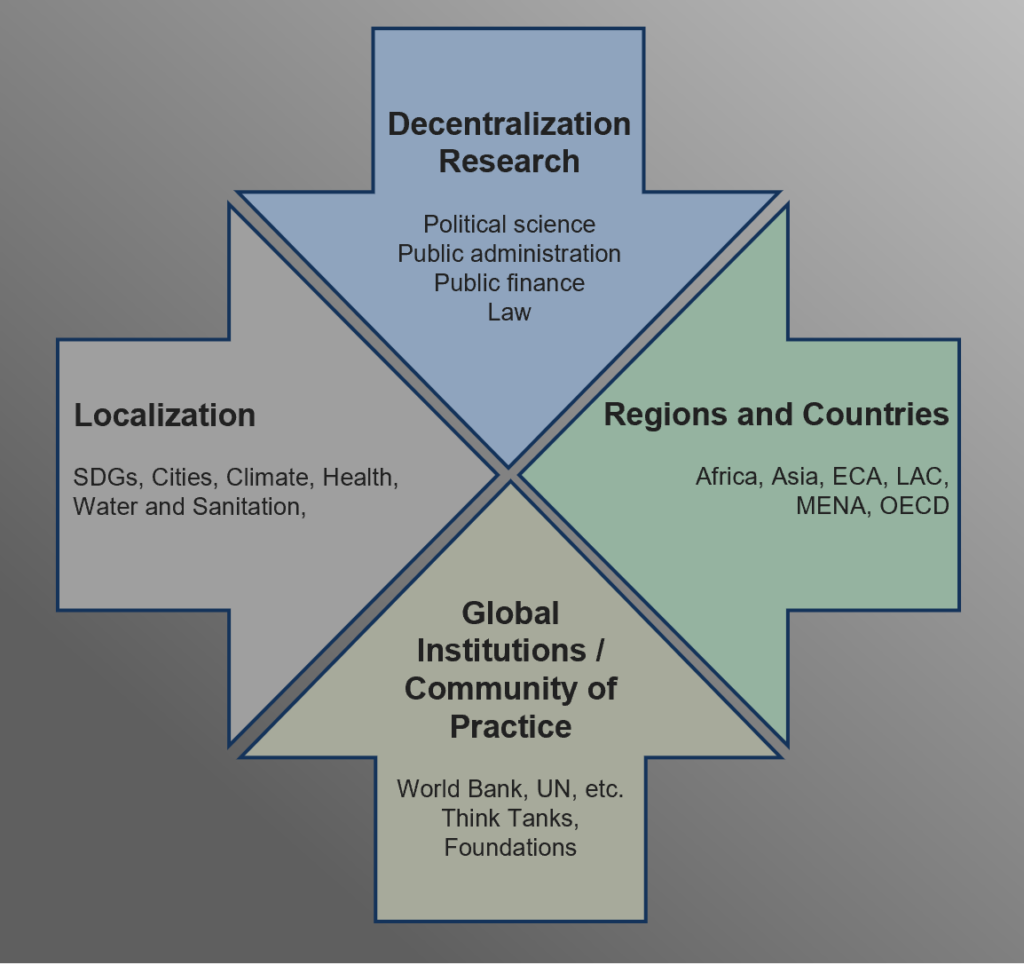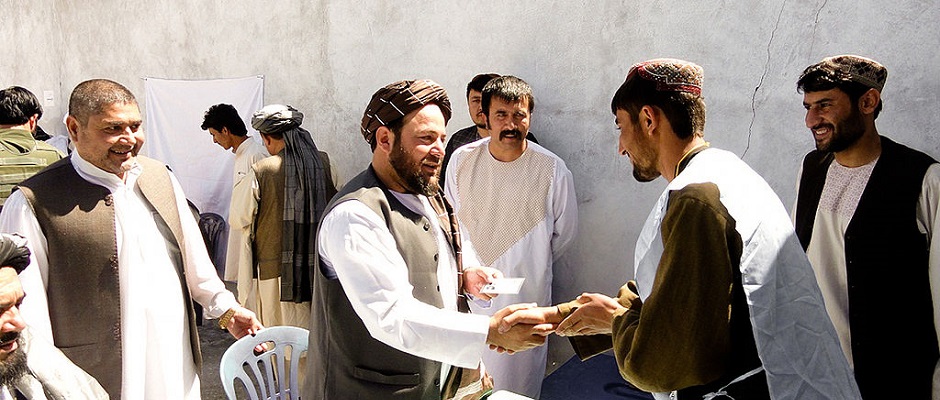
The study of decentralization and localization deals with how multi-level government systems work. The goal of most policy practitioner or researchers, however, is often not to study decentralization or localization for the sake of understanding decentralization and localization itself. Instead, many practitioners and researchers come to the topic from different angles in pursuit of policy questions or policy challenges that are seemingly unrelated to the vertical or intergovernmental structure of the public sector:
- How can the constitution be written to make sure that everyone feels that they are included and represented?
- How can we make sure that the government collects taxes equitably and spends taxpayer resources efficiently?
- How can the public sector be structured in a way that reduces political tensions and avoid political violence?
- What can be done to reduce teacher absenteeism?
- How can the motivation and capacity of front-line health workers be strengthened to effectively deliver health service?
- How can we ensure that development is community-led while still achieving national priorities?
- How can development agencies fund water and sanitation infrastructure while avoiding the “build-neglect-and-rebuild” trap?
- How can the Sustainable Development Goals be achieved everywhere in a country, including in historically disadvantaged regions?

Answering any of these questions requires the recognition that the ability of the public sector and society to be inclusive, responsive and effective depends on the way in which the public sector is organized below the national level and based on how stakeholders at different levels of the public sector work together in order to achieve results. That is the core challenge of decentralization and localization.
The Local Public Sector Alliance seeks to bring together the global Community of Practice around Decentralization and Localization, which includes stakeholders that approach the topic from four separate perspectives:
Thematic perspectives
Even though decentralization and localization are cross-cutting topics, academics and researchers tend to divide public sector management into different thematic dimensions based on their respective disciplines. For instance, the legal profession tends to focus on the architecture of a country’s multi-level governance system, whereas political scientists, public administration specialists and economists tend to focus on public sector governance, public administration and public finance across different government levels, respectively (i.e., political decentralization, administration decentralization and fiscal decentralization). A fifth thematic dimension of an inclusive and responsive public sector is community participation and accountability.
Sectoral perspectives.
A second entry-point into debate surrounding the effectiveness of multi-level public sectors is from a sectoral perspective. Many of the public services that are needed to achieve resilient, inclusive and sustainable development —education, health services, access to water and sanitation, basic urban services, climate resilience, and so on—are delivered at the local level. A better understanding of the multi-level nature of public service delivery is increasingly recognized as a foundation to localizing the SDGs and to achieving sectoral development objectives.
Country and regional perspectives
A third set of perspective to decentralization and localization is brought by country level scholars and practitioners. Although decentralization and localization are quintessential to achieving resilient, inclusive, sustainable, equitable and efficient development, different approaches to decentralization and localization are pursued in different countries. While the extent and nature of decentralization and localization has varied among different global regions (Africa, Asia, ECA, Latin America & Caribbean, MENA and OECD), a common vocabulary and a shared understanding of the underlying principles of decentralization and localization can help different countries learn from each other’s experiences.
Institutional perspectives
A final group of perspectives is brought to decentralization and localization by looking at the topic from an institutional perspective: decentralization and localization will look differently based on the institutional perspective of the observer. For instance, it is not unusual for central ministry officials to be concerned about the impact that decentralization policies have on their ability to achieve national or sectoral policy objectives and decry the lack of local capacity and local political will. Conversely, local-level officials (and their associations) are likely to view decentralization and localization through the lens of the functions that are assigned to them and may raise concerns about the limitations of the powers, discretion and resources provided to them by the center, which often limit their ability to respond effectively to the needs of their constituents.
Similarly, global development practitioners tend to have different perspectives on decentralization and localization depending on the institutional objectives of their own organization; their position within the organization (e.g., the governance unit versus the health unit); and the institutional position of their main country counterparts.
Much like the parable of the blind men and the elephant, many scholars and practitioners often only consider decentralization and localization from a single perspective, which typically falls into one of the four categories noted above. While the resulting specialization allows for a deeper understanding of the different aspects of decentralization and public sector management, the full picture of decentralization and localization—and the complexity of the animal being studied—only becomes obvious when the different observations are connected and collated. As such, the Local Public Sector Alliance takes a broad view of decentralization and localization, and welcomes a wide range different perspectives around decentralization and localization as a complex, cross-cutting and multi-stakeholder public sector reforms.



